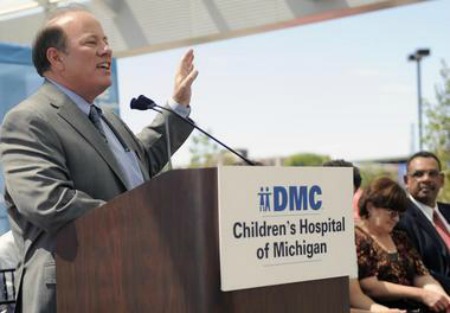
by Bankole Thompson
CHRONICLE SENIOR EDITOR
The majority on the Michigan Court of Appeals dealt a devastating blow to the Mike Duggan candidacy for mayor of Detroit by upholding a lower court decision that challenged the residency of the former Detroit Medical Center CEO, noting that he was unqualified to be placed on the Aug. 6 primary ballot.
The challenge to Duggan’s candidacy was brought forth by his boisterous opponent, Tom Barrow.
“This is the best solution for the city of Detroit. The court in upholding the new Detroit City Charter restores Detroiters’ faith in the objective rule of law and in treating all citizens the same regardless of wealth and stature,” Barrow said. “The Appeals Court has affirmed the wisdom of the people when they approved the new City Charter last year with the requirement that a candidate must be, at a minimum, a registered voter and resident of the city for at least one year as was the intent of the Charter Commission.”
The issue went to the Appeals Court after Wayne County Circuit Judge Lita Popke ruled that Duggan isn’t eligible to run.
The majority on the appeals court agreed with Popke’s ruling.
However, Appeals Judge Cynthia Diane Stephens provided the dissenting opinion stating, “I concur with the majority in all respects with regard to Duggan’s non-constitutional arguments. I write separately to respectfully dissent from the majority’s conclusion regarding the constitutionality of the Detroit City Charter provision’s residency requirements.”
In her dissenting opinion Judge Stephens wrote, “The Charter’s residency requirements are unconstitutional, as they impermissibly classify Duggan and other candidates on the basis of the candidate’s exercise of the fundamental right to travel. I would reverse the trial court’s opinion and order that defendants place Duggan’s name back on the ballot.”
Duggan had earlier questioned how Judge Popke could issue a 22-page opinion without hearing the oral arguments of the case brought by Barrow and labor activist Robert Davis.
“I found it very unusual that someone would write a 22-page opinion without hearing the oral arguments,” Duggan said.
“The court finds that the Detroit City Charter’s provisions regarding the qualifications for elective office are clear and unambiguous. The candidate must have been a qualified and registered voter in the city of Detroit for one year before he filed for office,” Judge Popke said in her ruling.
“The stakes are so high that we get somebody elected mayor and I’m going to try my best to make that happen,” Duggan said during a news conference last week. “This will be in the hands of the Court of Appeals and I’ll be out campaigning.”
The Appeals Court decision now leaves the Duggan campaign to appeal to the Michigan Supreme Court ahead of June 22 deadline for City Clerk Janice Winfrey to print absentee ballots.
If Duggan is not on the ballot by then, he cannot run for mayor.
Barrow was joined in his suit against Duggan by activist Robert Davis, who has initiated many legal fights against the state.
“It’s quite evident Mr. Duggan didn’t meet the requirements as set forth in the Detroit City Charter,” Davis said. “The people should send a very loud message for Mr. Duggan to go back to Livonia and run for mayor there.”
However, Duggan cited Chicago mayor and former White House chief of staff Rahm Emmanuel who had similar issues and was reinstated on the ballot by a higher court. He also noted that former Detroit mayor Coleman Young was kicked off the ballot in 1973 because he couldn’t run as a sitting legislator, but he was reinstated and went on to win.
Barrow has long maintained that Duggan’s residency as a technical flap disqualify him from the August ballot, calling Duggan’s campaign “another suburban transplant taking over the reigns of the city.”
In response, Duggan said Barrow is running a campaign of hate and divisiveness that does not reflect the views of the majority of Detroiters.
E-mail bthompson@michronicle.com.


